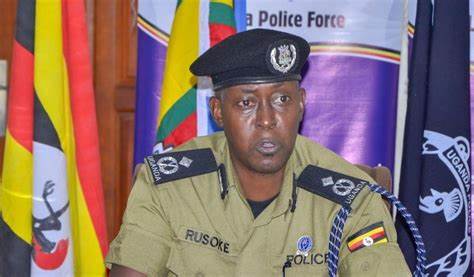The recent commendation by the Inspector General of Police, Abas Byakagaba, of two traffic officers, Constables Abdullah Tusiime and Charles Makawa, serves as a stark reminder of the often-overlooked dedication and professionalism within the Uganda Police Force. These officers’ actions, celebrated on social media, highlight the uphill battle that law enforcement faces, particularly traffic officers, who are frequently subjected to both public apathy and outright hostility.
Constable Tusiime, stationed at Kira-Road Police Division, was filmed during a torrential downpour in Kampala, courageously directing traffic at Mawanda Road, seemingly impervious to the elements. The viral footage of Tusiime, drenched yet steadfast, resonated with many who praised his unwavering sense of duty. However, this moment of admiration underscores a deeper issue—why such basic acts of public service should require such extraordinary effort and personal sacrifice.
Meanwhile, Constable Makawa’s ordeal at Nakawa Traffic Lights paints a troubling picture of the increasing aggression directed at traffic officers. After being assaulted by a female driver, Makawa showed commendable restraint, refusing to retaliate or escalate the situation. This level of professionalism, particularly in the face of physical assault, speaks volumes about the discipline and self-control that is often demanded of law enforcement officers—qualities that are too often taken for granted by the public.
In a press briefing, Assistant Commissioner of Police Kituuma Rusoke, speaking on behalf of the Inspector General, rightly applauded these officers for their conduct. He emphasized that Tusiime’s actions, despite the adverse weather, demonstrated a commitment to public service far beyond the call of duty. Similarly, Makawa’s professionalism in the face of provocation was recognized as exemplary. Yet, these commendations also serve to expose a broader issue: the routine disrespect faced by traffic officers and the unacceptable culture of violence against them.
Uganda’s traffic officers work under particularly challenging conditions, regularly exposed to physical danger and public hostility. The assault on Constable Makawa is, unfortunately, not an isolated incident. In 2022, the horrific attack on Constable Robert Mukebezi, who was shot and later had his leg amputated following an encounter with a soldier from the Chieftaincy of Military Intelligence (CMI), was a sobering reminder of the lethal risks these officers face daily. The attack occurred when Mukebezi attempted to impound an army vehicle involved in an accident, an event that epitomized the reckless disregard for law enforcement by certain segments of society.
This alarming trend of violence against police officers highlights a worrying lack of respect for law enforcement in Uganda. Such incidents are not merely acts of individual misconduct but reflect a deeper, systemic problem. The public’s failure to respect officers who are upholding the law is symptomatic of a broader erosion of civic responsibility. Traffic regulations, often seen as an inconvenience, exist for public safety. Yet, when officers like Tusiime and Makawa uphold these laws, they are met with both physical and verbal abuse.
The case of the female driver, Mercy Timbitwire Bashisha, who assaulted Constable Makawa, should set a precedent. The police have completed their investigation, and Bashisha has already been charged with assault. Her upcoming court case will be a test of whether the Ugandan justice system is prepared to take a firm stand against the abuse of law enforcement officers.
As Assistant Commissioner Rusoke reiterated, the police force will not tolerate such assaults, and the public is urged to comply with traffic laws and respect officers. However, words alone will not suffice. Uganda’s authorities must take concrete action to ensure the protection of its officers and address the culture of impunity that has allowed such attacks to proliferate. Public education campaigns, alongside swift legal consequences for offenders, are necessary to shift public attitudes.
Ultimately, the recognition of Constables Tusiime and Makawa is well-deserved. Yet it also serves as a stark reminder of the precarious conditions under which traffic officers in Uganda operate. These officers are not just enforcing laws; they are safeguarding public order, often at great personal risk. As a society, we must reflect on whether enough is being done to support and protect those who protect us.







Discussion about this post